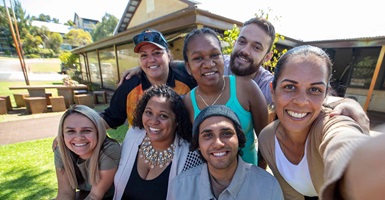We all know exercise is vital for our health and fitness.
But the last thing you want is to injure yourself and cause damage to your body right when you’re trying to strengthen it.
Chisholm Sports Academy Strength and Conditioning Coach Jonathon Kloester says regardless of whether you’re just starting a fitness regime, or if you already spend a lot of time playing sports and working out, you need to be aware of your safety. “Any athlete will tell you that injuries are the worst part of being an athlete,” says Jonathon. “Prevention is always better than a cure.”
Not sure how to stay safe while exercising? These tips will help to get you started.
Don’t skip your warm up
We all know warming up is important, but which warm up is best? Jonathon recommends movement-based warm up activities called 'dynamic stretches'.
Gone are the days of static stretching (holding a stretching pose for 30 seconds to a minute); Jonathon says this old school approach increases injury and decreases performance. Dynamic stretching involves starting at low intensities and then building into more vigorous high intensity/high impact specific movements that replicate the subsequent exercise activity.
Hydrate before, during and after your work out
Just a 1-2 per cent reduction in hydration can not only decrease your athletic performance, it has also been linked to an increased risk of injury.
Jonathon says dehydration is a very common issue amongst athletes, particularly at the sub-elite levels. He says to bring a water bottle to every training session and aim to replenish hydration levels with at least 1 litre of fluid per hour of exercise, with an additional litre after you finish.
Hot and humid conditions along with high strenuous exercise, can all increase the suggested fluid intake, so make sure you have plenty on hand to meet your needs. Jonathon says many athletes should consider consuming electrolytes (particularly salt/sodium) with their fluid intake, as this has been proven to help with rehydrating and in sustaining athletic performance.
Wear appropriate clothing and protective equipment
You might associate personal protective equipment (PPE) with medical masks and gloves, but there are some types of PPE to use during exercise. For example, sunscreen for outdoor sports, helmets for bike riding, protective pads for ball sports and mouthguards to protect your teeth.
Wearing the right shoes for the activity you’re doing will also help to ensure your feet are supported.
“Wearing the right clothing and using the right equipment will not only to optimise performance but to protect you from unnecessary injury,” Jonathon says. “Each sport or activity has different demands. Make sure you do your research before participating in whatever activity it is.”
Stop if you feel pain
Some discomfort is to be expected. Exercising, especially at higher intensities, can be very uncomfortable. But pain is something different altogether. If you experience pain in your joints when exercising or even at rest, Jonathon says to seek medical advice.
We’ve all heard the saying ‘No pain, no gain’ but it does not apply to exercise. Jonathon says continuing to exercise through pain won’t usually lead to gain. If something doesn’t feel right, have it checked out.
Seek advice from a fitness professional
Even professional athletes need advice from coaches and trainers, so make sure you consult with a fitness professional to ensure you’re looking after yourself properly during exercise. “Many people don't know where to start and there is a lot of misinformation available on the internet,” Jonathon says. “Doing things on your own, or without expert guidance, can often result in injury. Qualified coaches are experts in their fields and seeking their advice will go a long way to avoiding the many pitfalls clients and athletes make when beginning or transitioning to a new exercise regime.”
Qualified coaches can also provide you with an individualised plan that is specific to your needs and history, something many online programs and articles do not. Additionally, they can also provide you with essential feedback on your technique, which will not only prevent injury but may also fast track your development.
Please note: The information provided is general in nature. Information on individual dietary or safety requirements should be sought from a suitably qualified sports dietitian or fitness professional.


